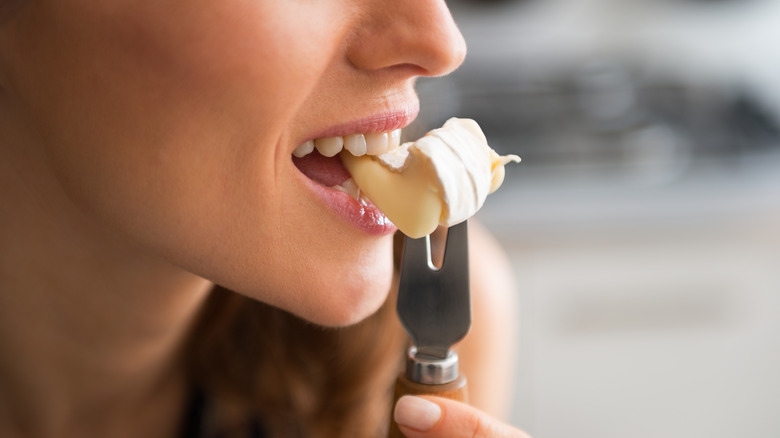How Early Should You Remove Cheese From The Fridge Before Serving?
Refrigerating and "un-refrigerating" are equally important when making the most of a delicious hunk of cheese. Unless you plan to eat it the same day, cheese must be stored in the fridge. Yes, even parmesan. Don't take just our word for it; we had an exclusive chat with Dominick DiBartolomeo, Owner and President of The Cheese Store of Beverly Hills and Domenico's Foods, about how to store all kinds of cheeses so they continue tasting the way the cheesemaker intended. And if you're preserving all that goodness, eating cheese at the right temperature ensures you enjoy it, too.
Refrigerated cheese is a shadow of its actual self. As it approaches room temperature, the fat molecules constricted by the cold loosen up. The volatile compounds responsible for aromas and flavors start to reactivate and the texture becomes creamy, making it easier to coat your palate so you can experience the entire range of flavors the cheese offers. For all this cheese magic to happen, it must reach a temperature between 68 and 72 degrees Fahrenheit. All cheeses benefit from coming to room temperature before being eaten, and similar to the nuances of storing them, hard, soft, old, and fresh cheeses also warm up differently. DiBartolomeo works with all kinds of them, as you can see from his store's Instagram @thecheesestoreofbeverlyhills. His pointers will ensure that every cheese on your next charcuterie board will be at its optimal flavor when consumed.
How to get cheese to the ideal serving temperature
Different cheeses take different times to warm up and it's important to consider the size of the cheese block you're using. In general, larger blocks take longer to come to room temperature. Even if their surface feels like the right temperature, their insides may still be cold. Considering some of the most complex flavors are often deep inside a cheese block, you want the whole block to come to temperature. While smaller pieces will warm up faster, cutting the block or wheel into wedges way beforehand is not recommended since it increases the cheese's exposure to air, drying it out. That said, if you don't plan on finishing the entire block, cut out only how much you think will be needed and store the rest of the cheese block carefully.
Figuring out how early a particular cheese needs to be removed from the fridge is quite simple. "Typically, I would allow firmer cheeses like Parmigiano and aged goudas around an hour to come to room temperature, and softer cheeses usually need about half that time," DiBartolomeo shared. This works to bring the cheese to the 68 and 72-degree Fahrenheit sweet spot, but the amount of time should be adjusted if the surrounding temperature is warmer or cooler.
Steps to prevent cheese from sweating
Remember how warming loosens the fats in a cheese? Some of that fat occasionally appears on the surface as small droplets, referred to as the cheese sweating. Many cheeses that go well on a charcuterie board tend to sweat as they warm, so don't panic if you see some droplets forming on them once they've been out for a while. Ideally, this should happen sometime after you've served them. Until then, you can follow a couple of steps to ensure the cheese doesn't sweat excessively during prep.
Uncovered cheese doesn't do well for extended periods as exposure to air and humidity causes sweating. Dominick DiBartolomeo recommends covering it with wax, parchment paper, or even a clean cloth to reduce sweating. It sounds counter-intuitive, but cheese also needs airflow to maintain the proper humidity, so always keep it in a well-ventilated area when it's being warmed. Covering your hard cheeses (or any cheese) with plastic wrap is not recommended when they're on the counter, and it's certainly not one of the best ways to store Parmesan in the fridge
To further decrease the chances of a cheese-sweat, consider the type of platter you choose to serve your cheese on. DiBartolomeo advises, "Use a cool, non-porous surface like a marble or granite cheese board. These materials help regulate the temperature and minimize sweating."


